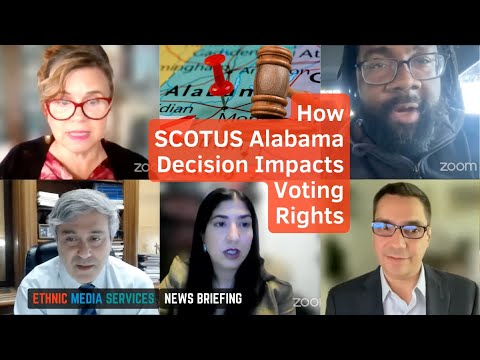Vidya Sethuraman
India Post News Service

The Supreme Court ruled on June 8 that the drawing of Alabama’s congressional districts violated the rights of black voters and that a second congressional district with a majority of African Americans should be established. The resolution is considered a major victory for people of color, and it will also have an impact on Asian minorities, especially in California. The Ethnic Media Center (EMS) held an online meeting on June 16th and invited civil rights experts to discuss the influence of the Supreme Court’s resolution.
The case, known as “Allen v. Milligan,” is a case in which African-American voters in Alabama sued the state for unfairly drawing congressional districts. According to statistics, about 27% of the population of Alabama is African-American, with an average of one out of every four people. However, after redrawing the constituencies, these African-Americans are too concentrated in one constituency, and other constituencies are diluted, resulting in only one of the seven congressional districts having a majority of African-American voters.
In the ruling, Chief Justice John Roberts and conservative Justice Brett Kavanaugh voted on the same front as the liberal justices, and decided Alabama 5-4. The gerrymandering violates Section 2 of the Voting Rights Act, which prohibits the practice of denying or reducing voting rights in elections based on race, and the court ordered the state to create yet another Congress with an African-American majority constituency.

Thomas A Saenz, Chairman and General Counsel (General Counsel) of the Mexican American Legal Defense and Educational Fund (MALDEF), said that the judgment of the Supreme Court is very important to the Races for the right to vote. However, this victorious judgment does not mean that the fight for voting rights can no longer be continued. For example, the case does not involve the legislative privilege of redrawing constituencies, that is, when legislators discuss the planning of constituencies behind closed doors, they may not disclose the contents of the discussions or disclose relevant evidence.
Evan Milligan, Executive Director of Alabama Forward, is one of the plaintiffs in the “Allen v. Milligan” case said that he couldn’t believe the news of the victory. The victory of this case will inspire people to believe in democracy and freedom, and he is very grateful to his family who supported him, friends and community. Next, we will continue to pay attention to the injustice of constituency drawing in the United States and local areas, and fight for the rights of the people.

Stuart Naifeh, Manager of the constituency-redrawing project of the NAACP Legal Defense and Education Foundation, said that the judgment of this case is undoubtedly a victory and is worth celebrating. He said that the white population in the United States is gradually declining, while the colored population is gradually increasing. This judgment will lay the foundation for the colored people to fight for voting rights in the future.







